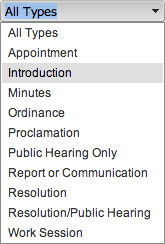Column: Learning Governance from Legistar
Last spring, The Chronicle began systematically publishing detailed previews of Ann Arbor city council meeting agendas. Part of that effort includes pointing readers to the city’s online agenda management system, which is hosted on a software platform called Legistar.
Legistar is an information-rich archive for upcoming as well as past meetings. I’ll grant you, it is not perfect. Legistar can at times be sluggish to respond or counterintuitive in its user interface. But Legistar will mostly cough up what you’re looking for.
The city of Ann Arbor has been using Legistar as part of its record management for Ann Arbor’s government for six years. By now I’d guess residents have figured out for themselves as much as they need or want to know about Legistar. So my purpose in writing is not to provide a tutorial on its use.
In this column, I’d like to focus on one feature of Legistar: the ability to classify meeting agenda items by category. The city of Ann Arbor’s Legistar system is set up so that an agenda item can be classified as: appointment, introduction, minutes, ordinance, proclamation, public hearing only, report or communication, resolution, resolution/public hearing, work session. Of those categories, I’d like to focus on just one: introduction.
I think that a more robust and meaningful use of “introductions” by the city council could lead to better public notice of upcoming council work, and more efficient use of limited city staff resources.
The change I have in mind wouldn’t be difficult to implement, and wouldn’t require changing the city charter to do it. But I’ll wrap up this column by noting how a change to the council’s approach to “introductions” could help get the ball rolling on a possible effort to review the city charter. [Full Story]




